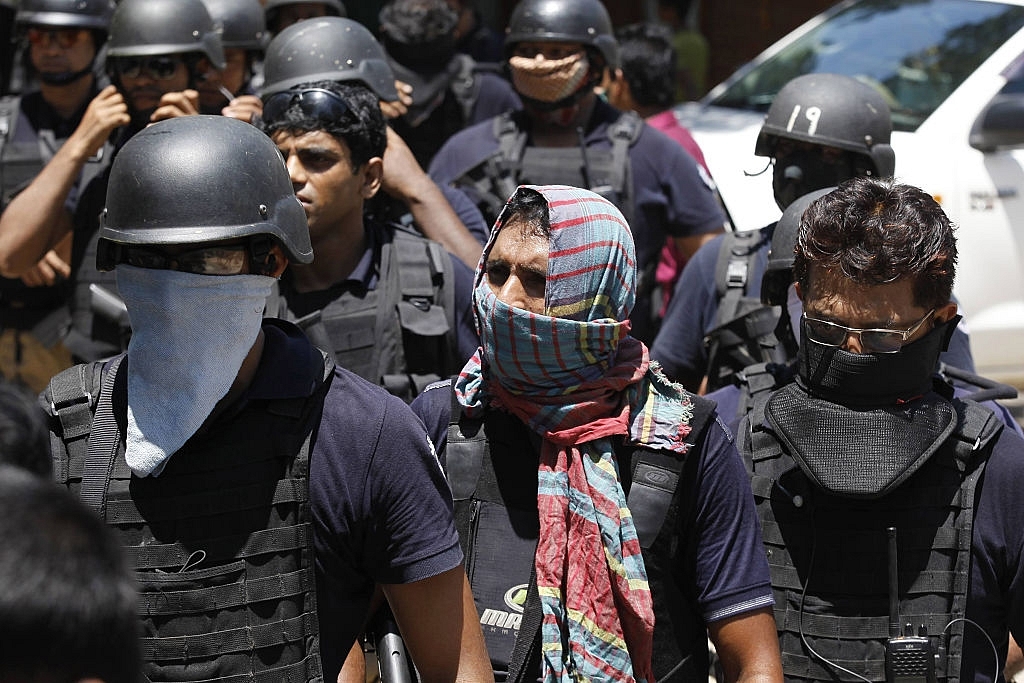Insta
How Bangladesh Is Cracking Down On The Islamic Militants On Its Soil

Bangladesh police attend the scene of an operation where they stormed a militant hideout in Narayanganj, around 25 km south of Dhaka (Mahmud Hossain Opu/Getty Images)
Three separate raids took place on militant hideouts on the outskirts of Dhaka, Bangladesh, on Saturday (8 October), leading to the death of 11 militants. The dead are believed to be members of Jamaat-ul-Mujahideen Bangladesh (JMB), the group which authorities have held responsible for an attack on a café in Dhaka this year, in which 22 people (mostly foreigners) had died.
Bangladesh police has been on the hunt for local Islamic militants ever since the Dhaka cafe attack took place. Reportedly, over three dozen suspected militants have died in shootouts with the police, including Bangladesh-born Canadian citizen Tamim Ahmed Chowdhury, who is regarded as the mastermind behind the Dhaka cafe attack.
At the time of the attack in Dhaka’s diplomatic quarter, Islamic State (ISIS) had rushed in to take responsibility. But it was unclear at the time whether ISIS really did have any links in Bangladesh. After all, it would be strange for ISIS to have skipped past Afghanistan, Pakistan and India to reach Bangladesh and use it to advance in South Asia. As Lt Gen Syed Ata Hasnain (Retd) wrote in an article for Swarajya, “Bangladesh fits nowhere in the realm of the strategic buildup of ISIS except a public relations effort to project its enhancing reach.”
As it turns out, Chowdhury did have links with ISIS. Reportedly the subject of a profile published in ISIS journal Dabiq, he was identified as one of Bangladesh’s top operatives. However, the Bangladeshi government has maintained that transnational groups like ISIS or Al Qaeda (the latter had also claimed responsibility for the attack) are not operating in the country.
However, JMB has pledged its allegiance to ISIS, and the police state clearly that JMB was behind the attacks. Could ISIS then be extending a more serious support to the local Islamic militants in Bangladesh than the country’s authorities realise?
This signals danger not just for Bangladesh but for the subcontinent as well. The National Investigation Agency (NIA) in India has been on the lookout for 21 persons who are believed to have joined ISIS. In the process, they have arrested six persons on Sunday (2 October) for allegedly plotting terror attacks in the country. They have also picked up three persons on Saturday (8 October) in Coimbatore for questioning as they seemed to have links with suspected ISIS recruiter.
As the ISIS traction grows in the subcontinent, intelligence agencies have to be more watchful than ever to stem the possible spread of ISIS in the region. For now, Bangladesh’s tough stance is certainly the right way to go.
Introducing ElectionsHQ + 50 Ground Reports Project
The 2024 elections might seem easy to guess, but there are some important questions that shouldn't be missed.
Do freebies still sway voters? Do people prioritise infrastructure when voting? How will Punjab vote?
The answers to these questions provide great insights into where we, as a country, are headed in the years to come.
Swarajya is starting a project with an aim to do 50 solid ground stories and a smart commentary service on WhatsApp, a one-of-a-kind. We'd love your support during this election season.
Click below to contribute.
Latest